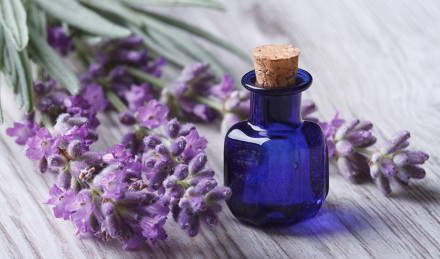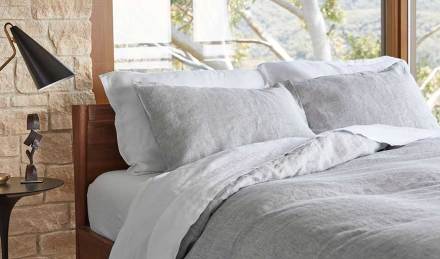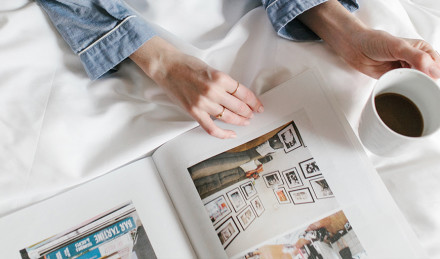We’ve all had those nights where, despite your best efforts to calm a frenzied mind, it races well into the morning hours. Research indicates that the key to a good night’s sleep could be the simple act of a calming pre-bedtime ritual. While we all wish we had the luxury of a nightly soak in the tub, we know it can be hard to find even five minutes to relax before bed. Good news: We’ve done the legwork for you and found simple ways to wind down that take little to no time. One approach we love is aromatherapy and herbology. Here, we share seven natural herbs that help you get a better night’s rest – and how they can be used most effectively.
Lavender
Best for: Falling Asleep
Lavender has been helping people nod off for thousands of years. This small, purple flower is one of the most commonly used herbs – it can be turned into essential oils, perfumes, rubs, candles and almost anything else. It has a variety of uses that includes easing aches and pains, disinfecting and deodorizing, calming insanity and, of course, preventing insomnia.
Best When: Spritzed on Your Bedding
Lavender is also an antibacterial, which helps keep your sheets fresh. Make your own spray by mixing 15-20 drops of lavender essential oil with rubbing alcohol, which acts as an emulsifier.
Lavender
Best for: Falling Asleep
Lavender has been helping people nod off for thousands of years. This small, purple flower is one of the most commonly used herbs – it can be turned into essential oils, perfumes, rubs, candles and almost anything else. It has a variety of uses that includes easing aches and pains, disinfecting and deodorizing, calming insanity and, of course, preventing insomnia.
Best When: Spritzed on Your Bedding
Lavender is also an antibacterial, which helps keep your sheets fresh. Make your own spray by mixing 15-20 drops of lavender essential oil with rubbing alcohol, which acts as an emulsifier.
Chamomile
Best for: Relaxing
For many, chamomile tea has been a nighttime staple for most of our lives. That’s because the flower has an incredibly gentle and effective sedative power. Experts call it “the world’s most soothing herb,” and many say it also prevents nightmares.
Best When: Drank as a Tea
Be sure to cover the tea as it seeps to prevent evaporation, which can lessen the brew’s effectiveness. Let stand for at least 10 minutes before straining. You can also try placing a cotton ball soaked in chamomile oil near your pillow to get the same effect.
Chamomile
Best for: Relaxing
For many, chamomile tea has been a nighttime staple for most of our lives. That’s because the flower has an incredibly gentle and effective sedative power. Experts call it “the world’s most soothing herb,” and many say it also prevents nightmares.
Best When: Drank as a Tea
Be sure to cover the tea as it seeps to prevent evaporation, which can lessen the brew’s effectiveness. Let stand for at least 10 minutes before straining. You can also try placing a cotton ball soaked in chamomile oil near your pillow to get the same effect.
Valerian Root
Best for: Calming a Racing Mind
Since the beginning of humankind, almost every civilization – including the Chinese, Indians, Greeks and Romans – have used valerian as a sedative. It’s an incredibly powerful herb (in the medieval times, valerian root sometimes was called “All Heal”), and it may be used to treat anxiety, reduce nerves, relieve muscle spasms and more.
Best When: Taken as a Pill
The herb itself is rather stinky and doesn’t taste very good, so capsules are recommended. Aim for 300 to 900 milligrams an hour or so before bedtime. Valerian Root can also be made into a tea, if you can tolerate the scent. Studies suggest that valerian root is most effective if taken daily over a period of a few weeks, though some may develop a tolerance after this kind of consistent use, so it’s best to alternate with other herbs.
Valerian Root
Best for: Calming a Racing Mind
Since the beginning of humankind, almost every civilization – including the Chinese, Indians, Greeks and Romans – have used valerian as a sedative. It’s an incredibly powerful herb (in the medieval times, valerian root sometimes was called “All Heal”), and it may be used to treat anxiety, reduce nerves, relieve muscle spasms and more.
Best When: Taken as a Pill
The herb itself is rather stinky and doesn’t taste very good, so capsules are recommended. Aim for 300 to 900 milligrams an hour or so before bedtime. Valerian Root can also be made into a tea, if you can tolerate the scent. Studies suggest that valerian root is most effective if taken daily over a period of a few weeks, though some may develop a tolerance after this kind of consistent use, so it’s best to alternate with other herbs.
California Poppy
Best for: Quelling Restlessness and Anxiety
Unlike the other types of poppies (think Dorothy and her crew just before they make it to Emerald City), California Poppies won’t get you high; they contain very, very trace amount of opiates. What they may do is help you sleep through the night by acting as a gentle sedative and anxiety reducer.
Best When: Used as a Tincture
Tinctures are often the most powerful way to take any herb, and with poppy there’s no exception. Take 30-40 drops twice daily; the second dose should be around bedtime.
California Poppy
Best for: Quelling Restlessness and Anxiety
Unlike the other types of poppies (think Dorothy and her crew just before they make it to Emerald City), California Poppies won’t get you high; they contain very, very trace amount of opiates. What they may do is help you sleep through the night by acting as a gentle sedative and anxiety reducer.
Best When: Used as a Tincture
Tinctures are often the most powerful way to take any herb, and with poppy there’s no exception. Take 30-40 drops twice daily; the second dose should be around bedtime.
Passionflower
Best for: Helping Frequent Wakers Sleep Through the Night
Passionflower was backed by the FDA as an over-the-counter sleep aid until 1978, when it was decided that there wasn’t enough research to prove its effectiveness. But that hasn’t stopped the legion of supporters who sing passionflower’s praise as a natural way to still your mind and improve your sleep quality.
Best When: Drank as a Tea or Taken as a Tincture
As a tea, aim for 2-5 grams per cup a few times each day; as a tincture, try 30-60 drops (0.5 to 2 ml) three times per day. Either way, aim to have your final dose 30 minutes or so before going to bed.
Passionflower
Best for: Helping Frequent Wakers Sleep Through the Night
Passionflower was backed by the FDA as an over-the-counter sleep aid until 1978, when it was decided that there wasn’t enough research to prove its effectiveness. But that hasn’t stopped the legion of supporters who sing passionflower’s praise as a natural way to still your mind and improve your sleep quality.
Best When: Drank as a Tea or Taken as a Tincture
As a tea, aim for 2-5 grams per cup a few times each day; as a tincture, try 30-60 drops (0.5 to 2 ml) three times per day. Either way, aim to have your final dose 30 minutes or so before going to bed.
Ylang Ylang
Best for: Relaxing
The aroma of ylang ylang is thought to affect the limbic system, which is the region in your brain that controls your mood and influences the nervous system. The scent of ylang ylang can promote relaxation and lower blood pressure.
Best When: Used as an Essential Oil
Try diluting ylang ylang essential oil with another oil, such as almond oil, and apply it directly to your skin, or add a few drops to a bath before bedtime. You can also sprinkle a few drops onto your sheets or onto a cloth near your bed. A diffuser works nicely, too.
Ylang Ylang
Best for: Relaxing
The aroma of ylang ylang is thought to affect the limbic system, which is the region in your brain that controls your mood and influences the nervous system. The scent of ylang ylang can promote relaxation and lower blood pressure.
Best When: Used as an Essential Oil
Try diluting ylang ylang essential oil with another oil, such as almond oil, and apply it directly to your skin, or add a few drops to a bath before bedtime. You can also sprinkle a few drops onto your sheets or onto a cloth near your bed. A diffuser works nicely, too.
Lemon Balm
Best for: Promoting Calm and Relaxation as well as Lowering Anxiety
This mint-looking plant has been used as a light sedative to help people sleep since the Dark Ages. Its key property is eugenol, a naturally occurring oily substance found in the leaves that can induce sleep.
Best When: Used Alongside Another Sleep-aiding Herb, such as Chamomile or Valerian Root
Dried lemon balm can be used in almost any way possible. Brew a relaxing tea with 1.5-4.5 grams (we’d try a chamomile-lemon balm blend), or take 60 drops of a lemon balm tincture daily.
Lemon Balm
Best for: Promoting Calm and Relaxation as well as Lowering Anxiety
This mint-looking plant has been used as a light sedative to help people sleep since the Dark Ages. Its key property is eugenol, a naturally occurring oily substance found in the leaves that can induce sleep.
Best When: Used Alongside Another Sleep-aiding Herb, such as Chamomile or Valerian Root
Dried lemon balm can be used in almost any way possible. Brew a relaxing tea with 1.5-4.5 grams (we’d try a chamomile-lemon balm blend), or take 60 drops of a lemon balm tincture daily.




